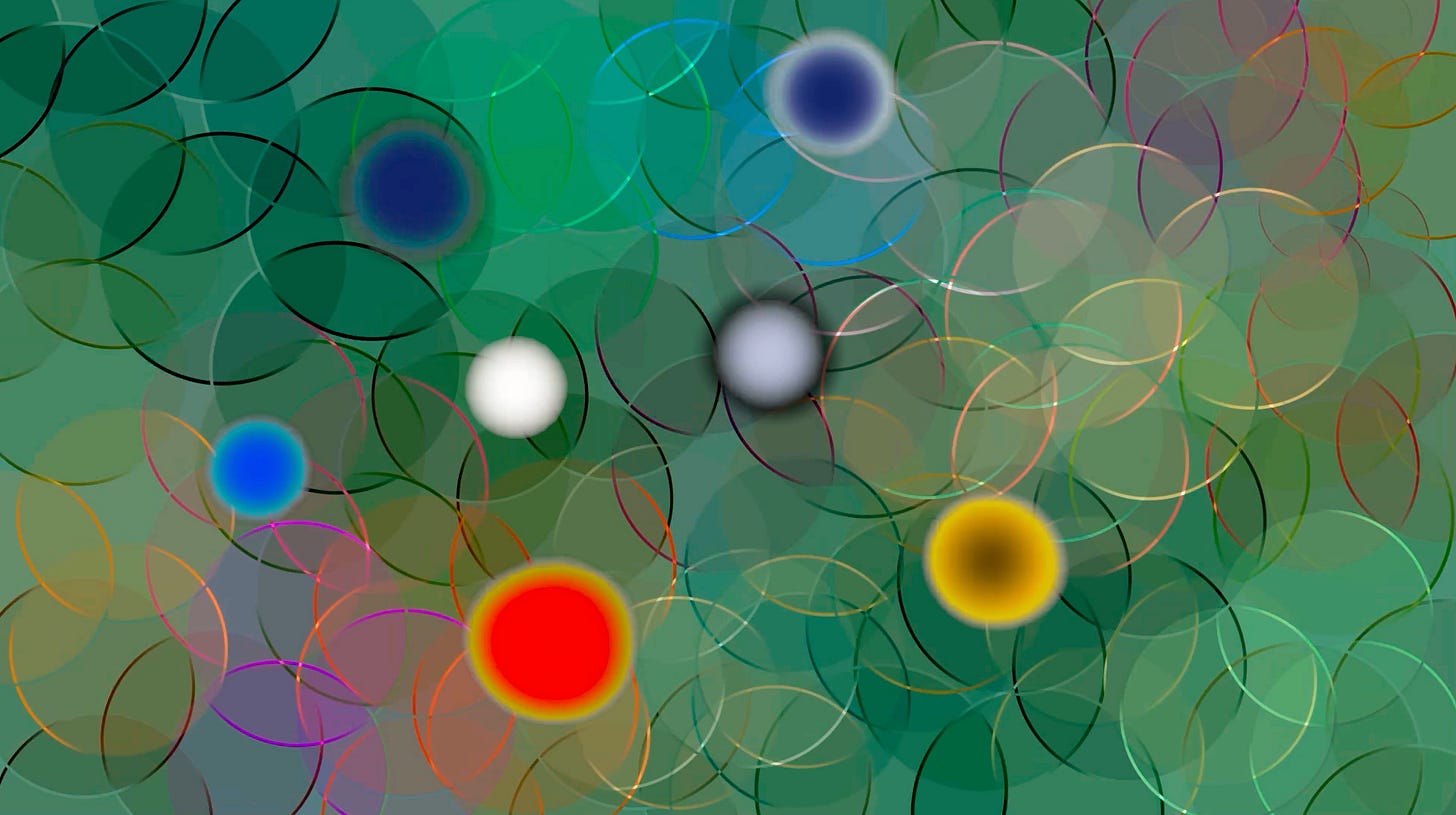From It’s Fantastic Stochastic Metalogue
Yoga for Healthy Lower Backs Course - Starts February 23rd 2024
A twelve-week course which supports you to better understand and support your back.
We’ll work with posture, breath, relaxation, anatomical approaches, the physiology of pain, mindfulness and much more. This is a holistic, scientifically validated approach that has changed many people’s lives for the better.
Dear Yoga Practitioner,
Being in Our Right Minds
We have become accustomed to being led; being told what to do. We’ve put our faith in politicians, large organisations and the media to guide us. Yet many of us have seen now that this trust is misplaced. Our leaders are, clearly, not in their right minds, and we follow them at our peril. Perhaps 2024 will be the year that we start to become more resilient and connected, heart-centred, and self-organising. I’ve been heartened by the increased interest in political change via proportional representation so that we might develop a more nuanced and engaged political system in the UK. Our current system is very clearly broken.
This article is about the samskara (habitual tendencies) that accumulate in our vijnanamayakosha (higher mind). My wish for a deep change of heart within politics, society and modern culture as we go forward into 2024 has something to do with how we access (or fail to access) the wisdom within this kosha.
Shifting the Dominant Worldview
You’ve heard me talk about Iain McGilchrist’s book quite frequently recently. It is highly relevant to the topic of changing the dominant worldview to one that is more heart-centred and humble, rather than self-centred and arrogant. This shift requires shedding a smaller, meaner, more “logical” (but far less wise) attitude to the many problems we face today. And concurrently embracing a more compassionate, complex systems-orientated, interconnected approach.
In Two Minds
For those of you familiar with Iain McGilchrist, the title of his book “The Master and His Emissary: The Divided Brain and the Making of the Western World,” describes the relationship of the two hemispheres of the brain. Iain is a neuropsychiatrist, a writer and philosopher and one of the few true polymaths alive today. His studies encompass a deep knowledge of music, art, history, literature, physics, neurobiology and clinical practice. The depth and breadth of his knowledge allow him to explore such complex ideas, like the meta crisis, without oversimplifying it or dumbing it down into a solvable problem.
Right Relationship
In the title of the book the left hemisphere of the brain is the Emissary, the faithful servant of the Master. The left hemisphere carries out specialised tasks in an efficient manner and reports back to the Master (the right hemisphere). The Master then makes the final decision (after much to-ing and fro-ing with the Emissary to fill in information gaps about how to proceed). The reason the Master is in charge is because she can take a much more global view than the Emissary, who is specialised in detailed, machine-orientated work. To be clear we need both sides of the brain to function well. However, McGilchrist gives many examples of how people with left hemisphere damage can live much more fulfilling lives than those with right hemisphere damage.
Whereas the Emissary (the left hemisphere) is only connected to the Master, the Master is connected to the Emissary and the whole (the wider context, our felt sense of the world, our intuition and imagination). As such, the right hemisphere can sense what things would feel like for another being, and what the broader implications are for our actions in the world.
Balancing Our Needs within a Broader Context
The Master realises that we need to use consideration to balance our own needs carefully with the needs of other beings and Nature as a whole. This right hemispheric thinking, which is akin to the Higher Mind (vijnanamayakosha) recognises that we are all Nature, and as such, interconnected at a fundamental level.
We are engaging vijnanamayakosha when we have feelings of empathy, compassion and care for all beings, for the natural world. When we allow these feelings to guide us, we act with more integrity and awareness. Sadly, our culture facilitates the use of the lower mind, manomayakosha. Although this is changing quite rapidly, we have been up until now, indoctrinated into a materialistic, reductionist human economy. Thus we have historically tried to tame complexity, avoid interconnectivity and hide the dire consequences of our actions. Our main task has been “how I can achieve and accumulate more” (unwittingly, at the expense of the whole).
The Wrong Mind is in Charge
We need both of these “minds” because they are equally important for our survival. However, when the wrong mind is in charge, our survival as a species is threatened. The highly destructive effects of the left-hemispheric way of thinking are now being revealed in almost every aspect of life. Our rubbish is turning up on foreign lands and in oceans, our sewage and other pollutants are being flushed into our rivers and seas, our systems are collapsing our governments are not fit for purpose. Nothing is working well at a systemic level and we seem unable to fix these problems with our lower minds.
As you might realise, there is an issue with the balance of power of these two hemispheres in modern humans. The Emissary has been given the power within myriad modern minds to make decisions regarding politics, economics, foreign policy, medicine, ecology, education and many other important areas of life and society. Yet it is not only those in positions of power who have this imbalance, sadly most of us have minds which are skewed towards left-hemispheric thinking. It is like an infection to which few people are immune.
Finding Your Voice
However, there are many examples of people who favour the right hemispheric mode of thinking. Yesterday I had a wonderful chat with a musician who was describing her way of teaching (piano, voice) as being student-led. Sometimes students needed to embody their voice, rolling around on the floor, finding their voice in their elbow or their knee, expressing themselves in ways that they have never even dreamed up before. She also described asking her students to imagine the musical piece as a snow globe, enquiring as to what and who would be in the globe, and what they might feel. And then she’d invite them to step into the globe and play the piece from inside this world. This method frees up the passion, feeling and imagination of the student, stimulating their vijnanamayakosha so that a whole new level of creativity and expression is revealed.
Waking Up the Higher Mind
This is radically different to the rigid way that many of us learned music, or anything else for that matter. To have the body and the feelings brought into learning something is to make it relevant to the real world, creating a tangible change. Teaching in this way wakes up the vijnanamayakosha with a spark of excitement and inspiration passing from teacher to student (and in the best-case scenario between them both), which is the essence of good teaching. As my partner Alistair (also a musician and music teacher) says, “One of the meanings of educate, educe, is to draw out, not to squash down.” Sadly our education systems have been more focussed on squashing us down, rather than enlightening our minds and uplifting our spirit. As such, we have been drilled into thinking in a linear, polarised, simplistic way, which has led us to expect a quick fix or to simply avoid looking at the problem at all.
The Other Side of the Peak
Like the negative samskara in the anandamayakosha, the habitual patterns of vijnanamayakosha are shared collectively, due to modern cultural norms. The dominance of the lower mind (manomayakosha) has reached a peak during these times. This tendency is bolstered by the overuse of technology and the lack of real-life connection, facilitated by the recent lockdowns and computerisation of everyday life. Yet I feel we might just be in the process of moving to the other side of this peak of modernity. We are certainly starting to realise that we desperately need more wisdom, interconnectivity and heart-centred relationship in our lives.
One approach to exploring these ideas is complex systems theory. This sounds like a very dry and boring scientific viewpoint, but it isn’t. One of the most creative thinkers in this field is Nora Bateson, who is the daughter of Gregory Bateson, an English anthropologist, social scientist, linguist, semiotician, and cyberneticist who also had an interest in systems theory as a means to better understand the intersections of all these subjects, in order to understand Life.
“The major problems in the world are the result of the difference between how nature works and how people think.”
Gregory Bateson
Understanding Complexity
To better understand complex systems theory, we might think about the relationships of connectivity expressed within our food system. We could start anywhere but let’s start with the soil…
What is in the soil, the beneficial microbes, the nutrients, the creatures that like to eat the soil or the seedlings; the additives that are put in the soil and the animals, plants or companies that create those additives; the seedlings planted in the soil; the farming methods and people who do the farming and harvesting; the amount of time and resources farmers have to research new methods of farming; their levels of stress and health; the beliefs and desires of the people who make the decisions about the growing, the buying, the packing, the distribution. The storage of the food, the preservatives and packaging methods, and how this affects the humidity, nutrition, vitality and longevity of the produce, the mould and fungi; the people who drive the food, for how long, for how many miles, the marketing, branding, selling of the food, their influences, education, politics who do the marketing; the cooking of the food, is it over or undercooked or burnt; thrown away or composted; who eats the food; how do they digest the food; does it create health, vitality, lethargy, toxicity; the excretion of the food and where does that end up; does it nourish or create imbalance.
Fractal Connections
Each of these related parts of the food system (plus the many I’ve not mentioned) is like a part of a wider whole that we could expand into like a fractal, exploring more and more interconnected relationships that are enmeshed and entwined mutually affecting each other in many nuanced and dramatic ways. People in all parts of this web of relationships might end up thriving or becoming very ill depending on how all these parts relate to each other.
It is basic to the Taoist view of the world that every thing-event (shih or wu)
is what it is, in relation to all of the others…The sun would not be light without eyes, nor would the. universe exist without consciousness and vice versa. This is the principle of mutual arising.
Tao The Watercourse Way
-Alan Watts and Al Chung-liang Huang
The study of complexity theory and complex systems is often dumbed down, by our left hemisphere, into simplistic stories that fit a certain narrative. This is the work of our lower mind (manomayakosha). Humans are prone to thinking in this way when we want to fix a problem, sell stuff, make money, convince people of a certain idea, or simply when we want to move on quickly to the next “problem to solve”. Being with complexity and realising the depth of our interconnectedness requires patience, curiosity and a mind that is capable of thinking outside of the box. It also requires compassion, empathy, understanding of others and care for how they truly feel. This is what it means to be truly wise.
An Ecology of Mind
Below is a lovely film about Gregory Bateson, made by his daughter Nora Bateson. I’m currently reading her book called Combining, which is a rich tapestry of exploration into the complex nature of living systems through a blend of intellectual inquiry, essays, poetry, storytelling and graphic art. I highly recommend this inspiring book for deeply expanding and fortifying your wise mind, vijnanamayakosha.
The Emissary thinks we can control Nature, and harness it for our benefit. Yet the Master knows we are part of Nature and as such we need to be in Nature and learn to go with its flow. We have to realise that we can’t impose ourselves upon Nature and bend it to our will, without dire consequences. To understand the predicaments we face, we are called to realise that we are Nature, part of the conscious, interconnected, complex whole and our actions affect everything within the system. This is the true wisdom of vijnanamayakosha.
Anyway, Nora Bateson explains it much better than me! So even if you don’t choose to buy the film, watch the trailer to give you a little taste of what complexity theory is, and how it can help us to elevate our thinking from lower to higher mind, from manomayakosha to vijnanamayakosha, and thus become more fit for meeting the many complex challenges we face these days.
With love and good wishes,
Julia xx











Share this post